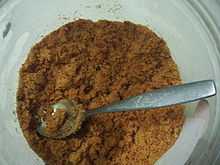Rousong, also called meat wool, meat floss, pork floss, flossy pork, pork sung, or yuk sung, is a dried meat product with a light and fluffy texture similar to coarse cotton, originating from Fujian, China. It also spread to Taiwan.[1] Rousong is used as a topping for many foods, such as congee, tofu, and savory soy milk. It is also used as filling for various buns and pastries, and as a snack food on its own. Rousong is a very popular food item in Chinese cuisine and Taiwanese cuisine.
Production
Rousong is made by stewing cuts of pork in a sweetened soy sauce mixture until individual muscle fibres can be easily teased apart with a fork. This happens when the collagen that holds the muscle fibers of the meat together has been converted into gelatin.[2] The teased-apart meat is then strained and dried in the oven. After a light drying, the meat is mashed and beaten while being dry cooked in a large wok until it is nearly completely dry. Additional flavourings are usually added while the mixture is being dry fried. 5 kg (11 lb) of meat will usually yield about 1 kg (2.2 lb). [citation needed]
Pork-less versions

Fish floss is roasted to look very much like its meat counterpart.

Beef floss for sale in Sulawesi, Indonesia
Fish can also be made into floss (魚鬆; yú sōng), though initial stewing is not required due to the low collagen and elastin content of fish meat.
In Muslim majority Indonesia, beef floss is the most popular variant, and meat floss is commonly called abon. Malaysian Muslims make and consume meat floss made from chicken or beef called serunding, which is a popular delicacy during Ramadan and Hari Raya Aidilfitri.[3]
Other versions
A very similar product is pork fu (肉脯; pinyin: ròufǔ; Pe̍h-ōe-jī: bah-hú), which is less fried and less shredded than rousong, and has a more fibrous texture.
Notable brands
North America
- Hsin Tung Yang USA (新東陽)
- Fragrant Jerky, Rosemead, CA, USA 新美香(美國)
- Formosa Pork Sung (寶島)
- Kimbo Brand Pork Sung
- Soo Singapore Jerky
Malaysia
- Loong Kee (Long Gei)
- Wing Heong
- Kiew Brothers (Wo lai Yeh)
- Chun Me Food Trading (xin quan mei)
- Bee Cheng Hiang (Měi Zhēn Xiāng)
- Muar Yuen Chen Siang
Singapore
- Bee Cheng Hiang (Měi Zhēn Xiāng)
- Fragrance Foodstuff (香味 Xiāng Wèi)
- Lim Chee Guan (林志源;Lín Zhì Yuán)
- Tan Chee Yuan (Chén Zhì Yuán)
- New Peng Hiang (Xīn Pǐn Xiāng)
Indonesia
- Abon Ratu (beef floss)
- Abon Ratu Mawar (beef floss)
- Abon Gloria (beef floss)
Taiwan
Philippines
- Eng Bee Tin Chinese Deli
- Bee Tin
- Lord Stow's Bakery
See also
References
- ↑ Grigson, Jane (January 1985), World Atlas of Food, Bookthrift Company, ISBN 978-0-671-07211-7
- ↑ Vickie Vaclavik, Elizabeth W. Christian. "Essentials of Food Science". Springer, 2003, p. 169.
- ↑ Thestar.com. "Thestar.com." Mum’s meat floss legacy. Retrieved on 2008-09-19.
|
|---|
| | Dishes and meals | | |
|---|
| | Xiaochi | |
|---|
| | Snacks and desserts | |
|---|
| | Beverages | |
|---|
| | Ingredients | |
|---|
| | Miscellaneous | |
|---|
|



